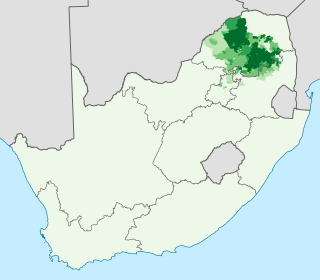
Sesotho sa Lebowa is a Sotho-Tswana language group spoken in the northeastern provinces of South Africa, most commonly in Mpumalanga, Gauteng and the Limpopo provinces. It is erroneously commonly referred to in its standardised form as Pedi or Sepedi and holds the status of an official language in South Africa.

The South African Republic, also known as the Transvaal Republic, was an independent Boer republic in Southern Africa which existed from 1852 to 1902, when it was annexed into the British Empire as a result of the Second Boer War.
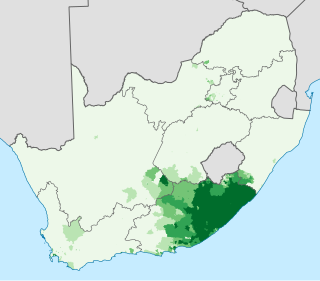
Xhosa, formerly spelled Xosa and also known by its local name isiXhosa, is a Nguni language, indigenous to Southern Africa and one of the official languages of South Africa and Zimbabwe. Xhosa is spoken as a first language by approximately 10 million people and as a second language by another 10 million, mostly in South Africa, particularly in Eastern Cape, Western Cape, Northern Cape and Gauteng, and also in parts of Zimbabwe and Lesotho. It has perhaps the heaviest functional load of click consonants in a Bantu language, with one count finding that 10% of basic vocabulary items contained a click.
An official language is a language having certain rights to be used in defined situations. These rights can be created in written form or by historic usage.
Linguistic imperialism or language imperialism is occasionally defined as "the transfer of a dominant language to other people". This language "transfer" comes about because of imperialism. The transfer is considered to be a sign of power; traditionally military power but also, in the modern world, economic power. Aspects of the dominant culture are usually transferred along with the language. In spatial terms, indigenous languages are employed in the function of official (state) languages in Eurasia, while only non-indigenous imperial (European) languages in the "Rest of the World". In the modern world, linguistic imperialism may also be considered in the context of international development, affecting the standard by which organizations like the International Monetary Fund and the World Bank evaluate the trustworthiness and value of structural adjustment loans by virtue of views that are commonly foregrounded in English-language discourse and not neutral.
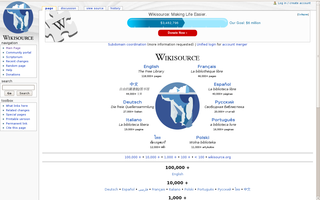
Wikisource is an online digital library of free-content textual sources on a wiki, operated by the Wikimedia Foundation. Wikisource is the name of the project as a whole and the name for each instance of that project ; multiple Wikisources make up the overall project of Wikisource. The project's aim is to host all forms of free text, in many languages, and translations. Originally conceived as an archive to store useful or important historical texts, it has expanded to become a general-content library. The project officially began on November 24, 2003, under the name Project Sourceberg, a play on Project Gutenberg. The name Wikisource was adopted later that year and it received its own domain name.

The Manding languages are a dialect continuum within the Niger-Congo family spoken in West Africa. Varieties of Manding are generally considered to be mutually intelligible – dependent on exposure or familiarity with dialects between speakers – and spoken by 9.1 million people in the countries Burkina Faso, Senegal, Guinea-Bissau, Guinea,Sierra Leone ,Mali, Liberia, Ivory Coast and the Gambia. Their best-known members are Mandinka or Mandingo, the principal language of The Gambia; Bambara, the most widely spoken language in Mali; Maninka or Malinké, a major language of Guinea and Mali; and Jula, a trade language of Ivory Coast and western Burkina Faso. Manding is part of the larger Mandé family of languages.
.za is the Internet country code top-level domain (ccTLD) for South Africa. The .za namespace is managed and regulated by the .za Domain Name Authority (ZADNA). Most domains are registered under the second-level domain .co.za.
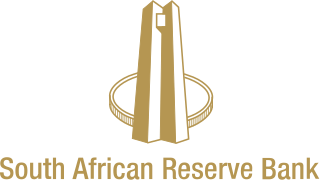
The South African Reserve Bank (SARB) is the central bank of South Africa. It was established in 1921 after Parliament passed an act, the "Currency and Bank Act of 10 August 1920", as a direct result of the abnormal monetary and financial conditions which World War I had brought. The SARB was only the fourth central bank established outside the United Kingdom and Europe, the others being the Federal Reserve, Bank of Japan and Bank of Java. The earliest suggestions for the establishment of the Central Bank in South Africa date back to 1879. A select committee, of ten members of Parliament, was established on 31 March 1920 to examine the benefits to the national interest of the establishing of the central bank.

South African Sign Language is the primary sign language used by deaf people in South Africa. The South African government added a National Language Unit for South African Sign Language in 2001. SASL is not the only manual language used in South Africa, but it is the language that is being promoted as the language to be used by the Deaf in South Africa, although Deaf peoples in South Africa historically do not form a single group.
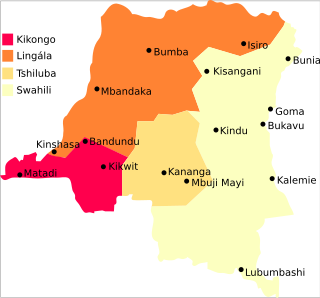
The Democratic Republic of the Congo is a multilingual country where an estimated total of 242 languages are spoken. Ethnologue lists 215 living languages. The official language, since the colonial period, is French, one of the languages of Belgium. Four other languages, three of them Bantu based, have the status of national language: Kikongo-Kituba, Lingala, Swahili and Tshiluba.
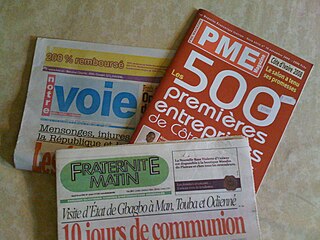
Ivory Coast is a multilingual country with an estimated 69 languages currently spoken. The official language, French, was introduced during the colonial period. This language is taught in schools and serves as a lingua franca in the country, along with Dioula.

The following outline is provided as an overview of and topical guide to Zimbabwe:
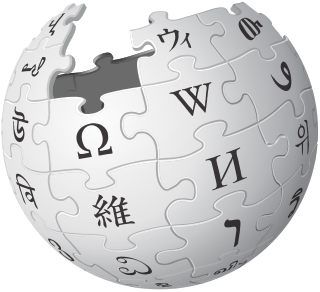
The following outline is provided as an overview of and a topical guide to Wikipedia:

Racial groups in South Africa have a variety of origins. The racial categories introduced by Apartheid remain ingrained in South African society with South Africans and the governing party of South Africa continuing to classify themselves, and each other, as belonging to one of the four defined race groups. Statistics South Africa asks people to describe themselves in the census in terms of five racial population groups. The 2022 estimates were 81.4% Black or Indigenous South African, 7.3% White South African, 8.2% Coloured South African, and 2.7% Indian South African.
Kaaps, also known as Afrikaaps, is a West Germanic African language that evolved in the Western Cape province of South Africa. Its status as a sister language of Afrikaans or a dialect of Afrikaans is unclear. Since the early 2020s there has been a significant increase in the number of works of literature published in Kaaps. Most works in Kaaps come from authors located in the Cape Flats area of Cape Town, South Africa where it is most commonly spoken. Although Kaaps is considered a growing phenomenon, it is more specifically a colloquial dialect of Afrikaans. All other distinct colloquial variations of Afrikaans, including Kaaps, are organically connected to Standard Afrikaans as a widely spoken unitary variety and interact with it.
SADiLaR, is a Department of Science and Innovation-sponsored initiative to create and manage digital resources and software supporting research and development in digital language resources in South Africa.












